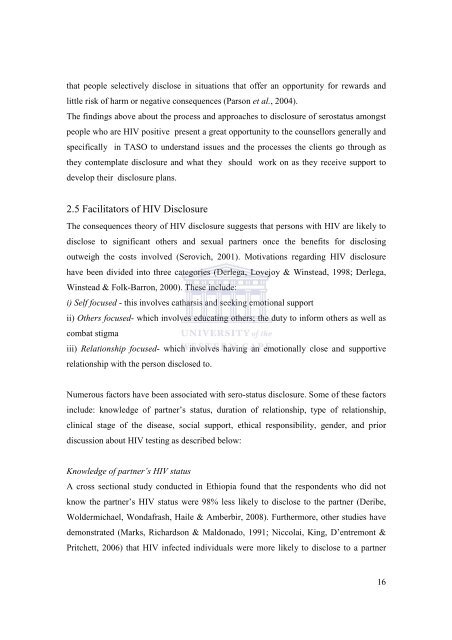Disclosure of Hiv status to sexual partners among people who ...
Disclosure of Hiv status to sexual partners among people who ...
Disclosure of Hiv status to sexual partners among people who ...
You also want an ePaper? Increase the reach of your titles
YUMPU automatically turns print PDFs into web optimized ePapers that Google loves.
that <strong>people</strong> selectively disclose in situations that <strong>of</strong>fer an opportunity for rewards and<br />
little risk <strong>of</strong> harm or negative consequences (Parson et al., 2004).<br />
The findings above about the process and approaches <strong>to</strong> disclosure <strong>of</strong> sero<strong>status</strong> <strong>among</strong>st<br />
<strong>people</strong> <strong>who</strong> are HIV positive present a great opportunity <strong>to</strong> the counsellors generally and<br />
specifically in TASO <strong>to</strong> understand issues and the processes the clients go through as<br />
they contemplate disclosure and what they should work on as they receive support <strong>to</strong><br />
develop their disclosure plans.<br />
2.5 Facilita<strong>to</strong>rs <strong>of</strong> HIV <strong>Disclosure</strong><br />
The consequences theory <strong>of</strong> HIV disclosure suggests that persons with HIV are likely <strong>to</strong><br />
disclose <strong>to</strong> significant others and <strong>sexual</strong> <strong>partners</strong> once the benefits for disclosing<br />
outweigh the costs involved (Serovich, 2001). Motivations regarding HIV disclosure<br />
have been divided in<strong>to</strong> three categories (Derlega, Lovejoy & Winstead, 1998; Derlega,<br />
Winstead & Folk-Barron, 2000). These include:<br />
i) Self focused - this involves catharsis and seeking emotional support<br />
ii) Others focused- which involves educating others; the duty <strong>to</strong> inform others as well as<br />
combat stigma<br />
iii) Relationship focused- which involves having an emotionally close and supportive<br />
relationship with the person disclosed <strong>to</strong>.<br />
Numerous fac<strong>to</strong>rs have been associated with sero-<strong>status</strong> disclosure. Some <strong>of</strong> these fac<strong>to</strong>rs<br />
include: knowledge <strong>of</strong> partner’s <strong>status</strong>, duration <strong>of</strong> relationship, type <strong>of</strong> relationship,<br />
clinical stage <strong>of</strong> the disease, social support, ethical responsibility, gender, and prior<br />
discussion about HIV testing as described below:<br />
Knowledge <strong>of</strong> partner’s HIV <strong>status</strong><br />
A cross sectional study conducted in Ethiopia found that the respondents <strong>who</strong> did not<br />
know the partner’s HIV <strong>status</strong> were 98% less likely <strong>to</strong> disclose <strong>to</strong> the partner (Deribe,<br />
Woldermichael, Wondafrash, Haile & Amberbir, 2008). Furthermore, other studies have<br />
demonstrated (Marks, Richardson & Maldonado, 1991; Niccolai, King, D’entremont &<br />
Pritchett, 2006) that HIV infected individuals were more likely <strong>to</strong> disclose <strong>to</strong> a partner<br />
16
















